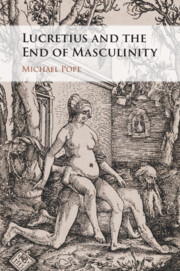Book contents
- Lucretius and the End of Masculinity
- Lucretius and the End of Masculinity
- Copyright page
- Contents
- Acknowledgments
- Abbreviations
- Chapter 1 Odd Men Out
- Chapter 2 Humbled Beginnings
- Chapter 3 Nature’s Assault upon the Senses
- Chapter 4 Death: The Hole That Gapes for All
- Chapter 5 The Ties That Bind
- Chapter 6 Vir Recreandus
- Bibliography
- Index
- Subject Index
Chapter 2 - Humbled Beginnings
Published online by Cambridge University Press: 11 May 2023
- Lucretius and the End of Masculinity
- Lucretius and the End of Masculinity
- Copyright page
- Contents
- Acknowledgments
- Abbreviations
- Chapter 1 Odd Men Out
- Chapter 2 Humbled Beginnings
- Chapter 3 Nature’s Assault upon the Senses
- Chapter 4 Death: The Hole That Gapes for All
- Chapter 5 The Ties That Bind
- Chapter 6 Vir Recreandus
- Bibliography
- Index
- Subject Index
Summary
The chapter takes us to the moment of biological conception and explores the question of male autonomy in embryonic fertilization and development. We will follow Lucretius’ lead into the reproductive organs of men and women to show how generative material supplied by female and male sexual partners both competes and cooperates at conception. What Lucretius reveals in forceful language and imagery is that men are impotent in the face of universal physics and that female reproductive assertiveness gives the lie to exclusive male dominion from the moment when genetic material from both parents first coheres in utero.
Keywords
- Type
- Chapter
- Information
- Lucretius and the End of Masculinity , pp. 35 - 56Publisher: Cambridge University PressPrint publication year: 2023

